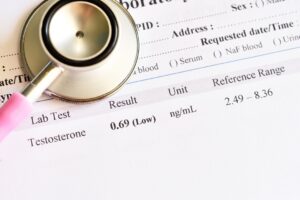
Authors of the study also said that treating men who have low-T with testosterone therapy may reduce the risk for serious COVID illness.
Researchers analyzed cases of more than 700 men who tested positive for COVD before vaccines were available and found that men with low T who contracted the virus were more than 2.4 times more likely to require hospitalization than men with normal T levels.
They also found that men who had been successfully treated for low T before catching COVID did not have increased risk for hospitalization.
Low T is rather common condition and some experts suggest that a third of men over 30 have it. Previous research had indicated that men hospitalized with COVID has abnormally low levels of the hormone, but it was unknown whether low T was a risk factor for, or result, of infection.
To identify whether it was a risk factor or result, they needed to find out whether men with chronically low T – before illness or after recovery – were getting sicker than those with normal levels.
After looking at T levels in infected men and the severity of illness, they found that Low-T was an independent risk factor – much like diabetes or heart disease – for severe illness requiring hospitalization. Treating low T helped negate the risk.
The study author said that risk really takes off when testosterone levels in the blood are lower than 200 nanograms per deciliter. Normal T is in the 300 – 1,000 range,
Low testosterone can have a number of effects on men, including sexual dysfunction, depressed mood, irritability, difficulty with concentration and memory, fatigue, loss of muscular strength and reduced sense of well-being.
The study does not prove that low T is an independent risk factor, however it does make an association with COVID severity.
Testosterone levels can be increased with hormone replacement therapy, as well as certain lifestyle measures like diet, exercise, stress management, and weight loss.